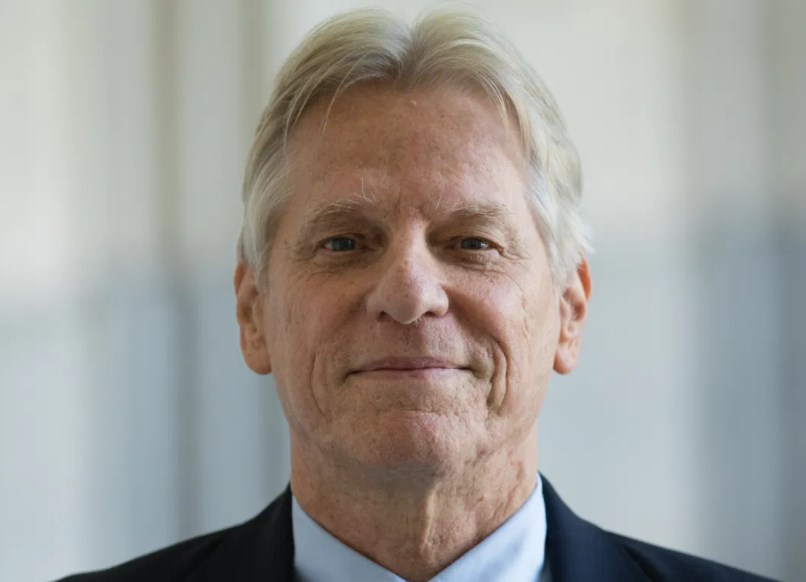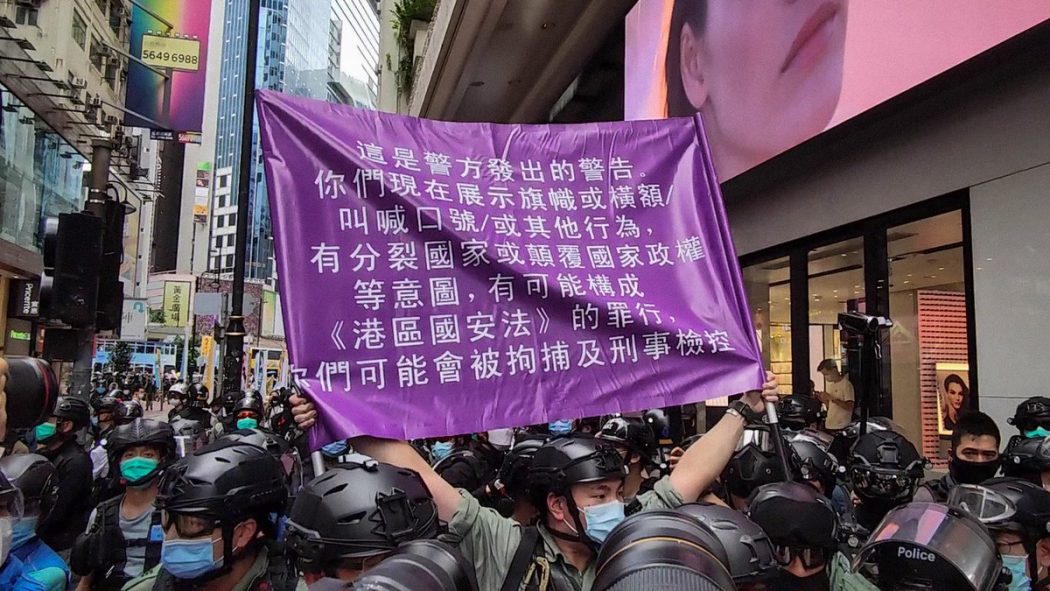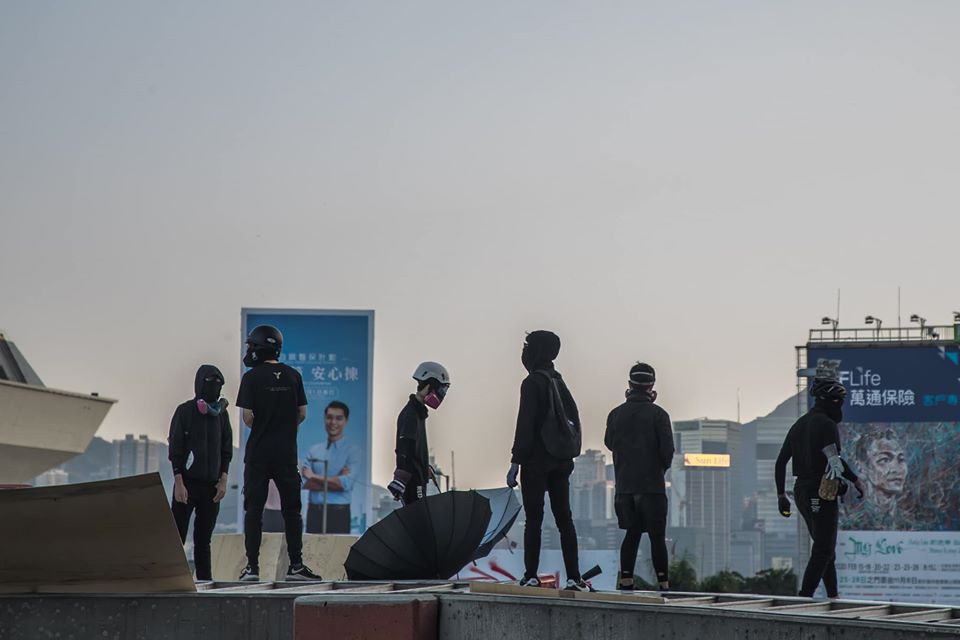Beijing’s new national security law is aimed at crushing dissent in Hong Kong and its people could eventually face a broadly similar fate to those in Tibet and Xinjiang, says a law professor and human rights expert who spent 30 years in the city.
The day after Beijing imposed the law on June 30, Professor Michael C. Davis sat down to write an update on Hong Kong’s constitution and human rights in the city.

Entitled Making Hong Kong China: the rollback of human rights and the rule of law, the primer went from blank page to the printing press in three months. In the work, published by the Association of Asia Studies at Columbia University Press, Davis drew on his decades-long expertise in Hong Kong’s constitutional development to evaluate the increasingly draconian developments in the city.
Davis, a law professor at the University of Hong Kong until 2016, told HKFP he sees a growing threat to the rule of law and judicial independence.
Riddled with contradictions
Davis, a scholar on human rights and democracy in Asia, has written regularly for the South China Morning Post and other newspapers. In an op-ed published in mid-September, he rejected the arguments put forward by the administration of Chief Executive Carrie Lam that there was no separation of powers under the Hong Kong system between the executive, the legislature and the judiciary.
Her comments, that the city is governed under an executive-led system involving the division of powers, fuelled fears that judicial independence could come under attack.
Davis said Lam’s comments lacked internal logic. “Carrie Lam really contradicted herself. It was very unambiguous: she said there were three branches of government [which have their] separate functions, and there’s checks and balances. That is the separation of powers.”
“You ask yourself why she’s saying this, if she’s contradicting herself? The obvious answer is she is trying to please Beijing. She’s basically saying what they want to say… same with [Justice Secretary] Teresa Cheng.”

“[Lam and Cheng] are not that stupid. They know Hong Kong has the separation of powers. They even define it when they’re saying [Hong Kong] doesn’t have it.”
The government’s argument that the system of governance is executive-led, as a rebuttal against the existence of the separation of powers, defeats itself, Davis said.
“It’s executive-led governments that typically have separation of powers – executive-led governments in the world at large are presidential systems and presidential systems have a separate executive, legislature and courts [which] use the separation of powers to hold these different branches of government accountable.”
“So saying that the government is executive-led is, in a sense, saying there needs to be a separation of powers… They’re presenting arguments that undermine their own case.”
Taming Hong Kong courts
Davis said the government’s statements are however a serious threat to the impartiality and independence of Hong Kong courts. “It’s really obvious that the government is saying these things to please the Beijing officials and put pressure on the courts so [judges] don’t challenge all the liberties they [the government] have under the national security law.”

Beijing’s intention, according to Davis, is to shackle Hong Kong’s institutions and weaken their power to “push back” against the central authorities. “Why is Beijing saying this [denying a separation of powers] if it’s obviously wrong? The reason is because Beijing doesn’t want local Hong Kong institutions to function as a check on what it wants to do… The thing Beijing wants to do is constrain the local government.”
As he sees it, the ultimate aim is to quash the constitutional safeguard of judicial review. “Beijing is trying to tame the use of the [court’s] power. They tamed the Hong Kong government long ago, they tamed the Legislative Council long ago, because they haven’t been willing to modify the electoral process in a significant way,” he said. “They’ve tamed the police and they seem to have tamed the Department of Justice as well.”
“What we have is severe pressure on the courts. This is orchestrated by Beijing because Beijing wants to take charge of what’s going on in Hong Kong and it doesn’t trust the Hong Kong government sufficiently to do what it wants.”
One major way Beijing is imposing its own agenda on the courts is the pressure on judges to abide by its expectations and punish those involved in the pro-democracy protests last year, the professor said.

He said the intention to “tame” the courts was made abundantly clear with the establishment of separate departments tasked specifically with dealing with national security cases within both the police and the justice department. “Everything relating to national security is secret and, of course, the national security committee is advised by the head of the Liaison Office.”
“So Beijing has really stepped in and taken very strong control of everything.”
Difficult choice
Foreign judges serving on Hong Kong courts may also face an uncertain future. The day after Lam’s “separation of powers” comment, Australian judge James Spigelman resigned from his post at the Hong Kong Court of Final Appeal (CFA). He told Australia’s national broadcaster ABC his departure was “related to the content of the national security legislation” but did not elaborate.
Davis, speaking before Spigelman’s decision became public, said foreign judges face a difficult choice between staying on to protect the rule of law, or making “a public statement that I’m not going to do it anymore because the HK system is no longer a rule-of-law-based system. That’s the choice the judges will have to make.”

Commenting later on the judge’s departure, Davis said it constituted “a significant reflection on the rule of law in Hong Kong after the passage of the national security law and the government’s statements regarding separation of powers.”
“Foreign judges who serve on the CFA face a dilemma as to whether to withdraw to express their displeasure at recent developments or to stay on to try to do their best under the new circumstances. The government should take little comfort in this problem and appreciate the global concern that is obvious. “
Since Spigelman’s announced departure, the government has announced the appointment of a senior British judge to serve on the Court of Final Appeal.
‘Horrible’ human rights violations
After living and teaching in Hong Kong for over 30 years, Davis left the city in 2016 to take up a fellowship at the National Endowment for Democracy in Washington D.C. But he still teaches two human rights courses for the University of Hong Kong remotely from New York owing to the Covid-19 pandemic. He is unsure when or whether he will be able to return to the city.
Asked how he assesses the state of human rights in Hong Kong under the national security law, he said: “Its horrible. Virtually the entire national security law is a human rights violation.”

“The four crimes are not sharply defined,” the rights expert said, referring to secession, subversion, terrorism and collusion with foreign forces, adding that the law is being used to target substantially more than the “very few” promised by local authorities.
In his analysis, it is “without a question” that the law was designed to quash dissent. “My impression is that they are targeting for arrest people who have long been on their list – so the law’s not retroactive, they’re actually picking on the people they already don’t like,” he said.
Davis said the Beijing-promulgated legislation filled a gap in the government’s legal means of controlling Hong Kong citizens, with central authorities adopting a “Father knows best” approach. “There was a frustration with the inability under existing laws in Hong Kong to control the protests… It seems to me clearly the target was to bring these protests under control.”

The rights professor cited how dissent on the mainland was crushed under the guise of national security. “China’s version of national security is not so focused overseas, but on its own people…. this is now being introduced to Hong Kong.”
This could mean Hong Kong could face a worse fate than becoming “just another Chinese city”, he said.
“I think the risks are greater than that, because Hong Kong is a peripheral community and there’s still a lot of difference between Hong Kong and the mainland. So it may be more of turning Hong Kong into a Tibet or a Xinjiang. Ordinary mainland cities will not have a very substantial base of opposition, whereas these peripheral areas of China have significant opposition.”
Unknown costs
In view of Beijing’s growing control over Hong Kong, Davis said the grim reality may be that many Hongkongers will emigrate. “I think Hong Kong people mostly have very little hope at this point. And so then the question becomes: What next? My guess is that we’ll see lots of immigration [by Hongkongers].”
This would be an incalculable loss to Beijing. “Hong Kong has been an extraordinarily valuable asset to China. It’s basically China’s New York or London so we just don’t know the cost of this diminution of Hong Kong that occurs if these hardline policies are not pulled back.”

Davis expressed puzzlement at Beijing’s tactics. “You would think at the end of the day, Beijing officials would step back and question why they are doing this and whether it’s beneficial, which, of course, it’s not. It just inspires distrust in Hong Kong. Their previous policies inspired protest in Hong Kong, so they’re digging their own grave.”
Ultimately, Davis said recent developments are a compelling indication that the city needs democratic change: “It’s a problem that the Hong Kong government doesn’t find its own voice. That’s why Hong Kong people have been demanding democracy, because they want a government that has a voice… [to] explain to Beijing officials why certain core values that are important in Hong Kong are missing here.”
“Instead, you get Hong Kong officials doing the opposite: explaining to Hong Kong people why their core values don’t matter.”
Michael’s new book “Making Hong Kong China The Rollback of Human Rights and the Rule of Law” is published this month by Columbia University Press.
Support HKFP | Policies & Ethics | Error/typo? | Contact Us | Newsletter | Transparency & Annual Report | Apps
Help safeguard press freedom & keep HKFP free for all readers by supporting our team
























